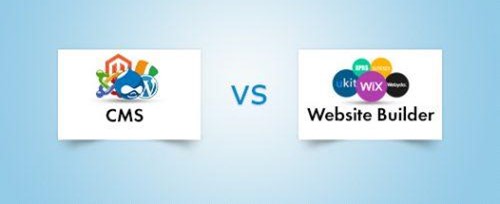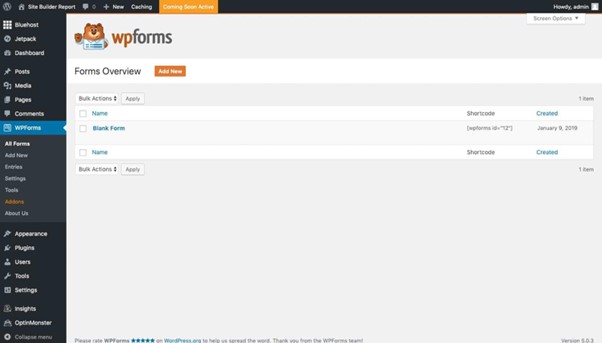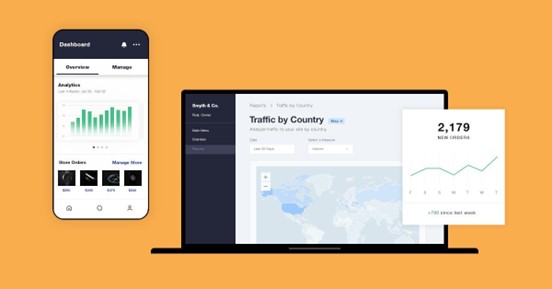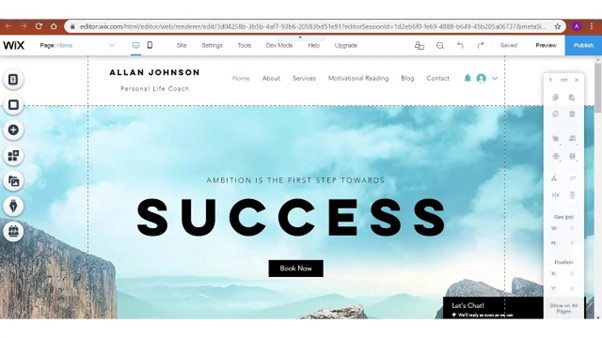
It's important to understand these eight significant differences before deciding whether you want to choose Wix vs WordPress for your site.
Both WordPress and Wix are website-building tools, but they take very different approaches:
There are two website builders: Wix and WordPress (or Content Management System). It is essential to comprehend the difference between the two before choosing.
Website builders like Wix are, in general, simpler to use but less customizable. They also include hosting, so you don't need to set one up, but you can never transfer your website from Wix to another web host.
{autotoc}
Wix vs WordPress At A Glance
- CMS vs Website Builders
Both Wix and WordPress are website builders with advantages and disadvantages.
- Editor
While WordPress abstracts itself from the page and doesn't display the entire page within the editor, Wix has a visual, drag-and-drop editor.
- Open vs Closed Source
WordPress is open-source and has thousands of plugins and themes, but these can be challenging to use.
Website Builders vs CMS

Although it has a longer learning curve, a CMS like WordPress is very customizable. You must set up WordPress on a web host, though that is not as difficult as it may seem (there are plenty of hosts offering 1-click WordPress installation).
WordPress is open-source, so anyone can use and modify it for free (though hosting, themes, and plugins can all cost money).
The choice between Wix and WordPress comes down to trade-offs: Wix is simpler to use but less flexible, whereas WordPress is more flexible but has a steeper learning curve.
I'm only beginning to scratch the surface of the differences; as you'll see in the following paragraphs, there are many other ways that Wix and WordPress differ, including in terms of templates, hosting, features, and customer support.
Just keep in mind that there is no right or wrong answer in the Wix vs. WordPress debate. Instead, the tool should be appropriate for the task; base your choice on the structure you are creating.
Note that WordPress.org—not WordPress.com—is the subject of this article. WordPress.com is a distinct service that is totally different and more akin to a website builder.
The Editor
The editor is one of the most obvious differences between Wix vs WordPress.
The editor on Wix is visual and drag-and-drop. You can move any element to any location on a page, just like in PowerPoint or Keynote.
With Wix, you can drag any element pixel by pixel to any location on your page.
Recently, WordPress relaunched its editor as a block-based editor called Gutenberg.

The Gutenberg editor for WordPress abstracts the page away from the user—you can't see the entire page in the editor, including the header, sidebar, and footer.
As a result, you'll continue to switch between the editor and the live website to see how the page appears:
The interface of WordPress is frequently abstracted from the page. A "short code" is used to embed forms made with plugins like WPForms into pages after they have been created in a separate interface.
Wix, in contrast, primarily uses visual editing. You can change something you see by clicking on it. The website remains visible at all times, and changes take effect immediately.
For instance, using the page editor, a form can be created.
In general, WordPress's user interface is more cluttered than Wix's, but this is to be expected. WordPress is more complex than Wix, and more complex software demands that it be more practical and abstract.
Wix strives for more welcoming pages. As far as website builders go, Wix is less user-friendly than WordPress but more cluttered than Squarespace or Weebly.
Open vs Closed

Being an open-source CMS, WordPress allows for contributions from anyone. This is both a significant strength and a weakness.
One benefit is the abundance of open-source community-made plugins and themes available for WordPress. At the time of writing, there were more than 12,000 themes on Themeforest and more than 55,000 plugins on WordPress.org.
That far exceeds the capabilities of any website builder.
But WordPress' diversity can also make a mess of things. WordPress backends are notoriously difficult to understand.
Long technical settings pages are possible, and the language can frequently become esoteric and jargon-filled.
Additionally, using one of WordPress' numerous themes or plugins is never entirely successful. There are frequent incompatibilities, and fixing them may require users to make changes to the code—something not everyone is comfortable doing.
Simply perusing plugin reviews will give you an idea of the annoyance.
Wix is entirely distinct. They provide an App Market that resembles WordPress plugins in appearance but is actually different. It is a small, carefully curated collection of about 300 apps, which is in no way comparable to the enormous repository of WordPress plugins.
In contrast to WordPress, Wix tests every app for compatibility, so you can be sure that they will integrate flawlessly (there are rarely any compatibility issues or need to tweak code).

With themes, the same is true. Wix has fewer themes than WordPress, with about 500... However, none of the themes need any coding adjustments to function properly.
Additionally, Wix's visual theme editor allows for such extensive customization that you could create your own theme from scratch right away.
Wix is made to be amateur-friendly, so you shouldn't need to hire outside help unless you're doing something really unusual.
With WordPress, if you become frustrated trying to integrate themes and plugins, you may end up hiring a WordPress professional to help you build your website.
Overall, WordPress is made to be customizable, while Wix is made to be user-friendly. Not that WordPress doesn't care about user-friendliness—the WordPress team actually puts a lot of effort into making WordPress user-friendly.
The Wix team genuinely cares about creating a customizable website builder, so it's not that Wix doesn't care about customization.
Instead, these distinctions are simply inherent to how website builders and CMSs work. You should carefully consider the requirements of your website and base your choice on those requirements.
There is no decision that is always right or wrong.
Features
Let's now talk about Wix vs WordPress features.
You'll probably discover Wix has everything you require if you're creating a website with traditional features. You can probably find a WordPress theme or plugin that supports any unusual features you require.
So, what constitutes an unconventional feature, and what is conventional? A photo gallery is a common feature, I suppose. There are numerous photo gallery options on Wix.
However, Wix does not allow you to create a photo gallery that scrolls horizontally (from left to right). That's way too unusual. However, you could find a WordPress plugin to do it.
The diversity of WordPress' ecosystem—which includes more than 55,000 plugins and 12,000 themes—is one of its strongest points.
In other words, if you have a particular feature or aesthetic in mind, WordPress can probably accommodate it. Here are a few illustrations:
- By integrating with the WordPress user interface, bbPress enables you to add message boards to your website.
- Buddypress enables your WordPress website to transform into a social network.
- A very well-liked SEO plugin called Yoast SEO adds XML sitemaps, canonical URLs, meta title and description templating, and other features.
- You can manage 301 page redirects with redirection.
- An advanced database builder, like Advanced Custom Fields.
Tablepress provides a spreadsheet-like interface for creating tables (you can even add formulas).
The WordPress post editor is converted into a TinyMCE editor by TinyMCE.
My point is that WordPress plugins are available for all kinds of features. The number of features Wix can support will never be as great.
But if you only require standard features, I'd suggest Wix.
Websites that follow the rules don't try to reinvent the wheel. They are the standard websites for eateries, charities, photographers, and other small businesses.
They require Google Maps, contact forms, and photo galleries, but nothing particularly unusual.
All of these features are covered by Wix, and they frequently make it simpler than WordPress. One search for "photo gallery plugins" on WordPress, for instance, yields literally hundreds of results.
How are you supposed to determine which is correct? There's no need to do any searching when using Wix. Wix comes with a fantastic photo gallery, so you can start using it right away.
And while Wix doesn't have as many features as WordPress, the ones it does have are reliable. You won't waste afternoons experimenting with various plugins to determine which one works with your theme.
Themes
Wix offers more than 500 themes, which is a respectable number for a website builder but far less than WordPress, which has more than 11,000 themes.

WordPress has a larger selection than plugins, but you may occasionally run into compatibility problems that call for coding to debug. Although Wix has a smaller selection, you'll never find a theme that needs to be modified in order to work with Wix features.

WordPress's Customizer is a useful tool that lets you click on elements to reveal style options or simply browse the interface to modify styles.
Wix takes a totally different tack. Wix elements are moveable and can be grabbed. You can pick and choose elements, and you can instantly customize.
We believe that between wix vs WordPress, WP has the edge in themes.
Security
It is impossible to overstate the significance of website security! Cybercrime costs businesses close to $6 trillion annually, and even worse are the losses in data, reputation, and customer confidence.
So how does Wix vs WordPress fare when it comes to security?
When comparing "website security," Wix triumphs over WordPress without a doubt. Why so? Understanding how websites are hacked is the first step in comprehension.
The following are some typical causes of website hacks:
- The website server requires poor maintenance.
- The website makes use of a dangerous theme or plugin (s)
- Older scripts are used on the website.
- Security regulations have gaps. For instance, the administrator might use a flimsy password or grant extra permissions to others.
Wix is extremely secure because it is a closed system and because Wix's talented team handles everything from server upkeep to script updates.
Additionally, Wix is very picky about which third-party apps are featured on the Wix App Market; all third-party developers are required to adhere to strict security standards.
In contrast, anyone can create a WordPress plugin or theme and publish it online. Additionally, users' websites will be vulnerable to hackers if those plugins or themes are poorly coded.
Additionally, if you choose to use WordPress, you'll be in charge of updating all elements that affect the security and functionality of your website, including PHP, WordPress core, plugins, themes, SSL certificates, and more.
Overall, average WordPress sites are marginally less secure than typical Wix sites due to their dependence on you and outside developers (who may be incompetent).
Here are some statistics as evidence:
- WordPress sites are three times more likely to contain malware than non-CMS sites.
- 18% of WordPress websites have a vulnerability.
- Every five plugins you add to your WordPress site almost doubles the risk of compromise.
Naturally, this doesn't preclude you from having a secure WordPress site—WordPress powers 40% of the internet, after all. To make it as secure as a Wix site straight out of the box, however, requires some work and/or money.
For instance, your WordPress website will be secure if you regularly update everything, only use plugins or themes from reputable developers, add a security plugin like Wordfence or Sucuri, etc.
SEO
The process of improving your website for search engines like Google is known as SEO, or search engine optimization.
When it comes to the WordPress vs Wix for SEO debate, the internet is split into two sections:
- The majority of SEO experts believe WordPress is better for SEO.
- On the other hand, some people think that as long as web pages can be indexed and crawled, SEO results are independent of the platform.
I think there is truth on both sides.
The essential website SEO features required to rank a website are all present in Wix. With Wix's integrated SEO features, for instance, you can add meta titles and descriptions, alt tags, 301 redirects, structured data, and more.
Additionally, Wix consistently updates and adds new features to its Wix SEO Tools.
However, WordPress is a better option for advanced SEO due to its flexibility and the variety of plugins available for WordPress SEO.
One of the best WordPress SEO plugins, RankMath, for instance, has features for content optimization, rank tracking, internal link building, scanning for indexing problems, advanced schema generation, and much more.
Pricing
Wix vs WordPress prices have many differences, making it difficult to compare them.

Everything you need is included in a single Wix package, including hosting, e-commerce, themes, apps, and customer support. (While most apps on the Wix App Store are free, some do require a fee.)
The WordPress core is free, which makes it unique. However, you might have to pay for hosting, plugins, and themes.
For instance, BlueHost charges $7.99 per month for hosting WordPress. From ThemeForest, a premium theme might cost $39 (though you get it for life, and there are also free WordPress themes available).
There are also premium WordPress plugins. WooCommerce is an e-commerce plugin, but it also offers add-ons (extensions) that add particular features and range in price from $0 to $299.
For instance, the $79 UPS Shipping Method extension provides UPS shipping rates. WPForms is a drag-and-drop WordPress form builder with an annual price beginning at $40.
Customer Support
Wix offers phone, chat, and email customer support as part of all of its packages. For a premium fee, you can also get VIP Support, which allows you to bypass the line.
WordPress does not offer customer support since it is free and open-source, but if you pay for a theme or plugin, the developers frequently include support as part of the price (support is obviously only available for their theme or plugin, of course).
IMH
Do you want a fast website?
Who am I kidding? Don't we all?
So why do so many of us struggle?
The biggest challenge is usually finding a fast, reliable hosting company.
We've all been through the nightmares - support take takes forever or doesn't resolve our problem always blaming something on your side...
But the biggest bummer is that the website always feels slow.
At CollectiveRay we host with InMotion hosting and our website is stupid fast. We run on a custom stack of LightSpeed server setup on MariaDB with a PHP7.4 engine and fronted through Cloudflare.
Combined with our front-end optimizations we reliably server 6000 users every single day, with peaks of 50+ simultaneous users.
Want to get a fast setup like ours? Transfer your site for free to InMotion hosting and get our 50% OFF on current pricing.
Try InMotion Hosting with 50% OFF for CollectiveRay visitors in December 2025 ONLY!
Wix vs WordPress - Frequently Asked Questions
Which is better, WordPress or Wix?
There is no one right response. If you want to quickly create a website and never have to worry about maintaining it, Wix is better; if you want flexibility, WordPress is better.
Is Wix more user-friendly than WordPress?
WordPress is more difficult to use than Wix. Wix includes a simple drag-and-drop editor, web hosting, SSL, themes, and everything else required to launch a website. So in general, WIX would be easier to use than WordPress.
Is Wix more affordable than WordPress?
Given that both are priced differently, it is difficult to say. Wix is an all-inclusive package that has all the components you'll need to create a website. WordPress is free, but everything else—including the open-source CMS platform—must be purchased. Additionally, the price of that "everything" depends on your needs. For instance, a Wix plan will cost more than a premium managed WordPress hosting plan from Kinsta, Cloudways, WpEngine, etc. You can get shared hosting for as little as $1 per month on the more affordable end. For WordPress, however, you'll have to pay for web hosting, SSL, themes, etc. Additionally, you'll have to invest time or money in maintaining it, and occasionally you'll even need coding skills to make a WordPress site function.
What distinguishes WordPress.com from WordPress.org?
Anyone can use WordPress.org's open-source content management system (CMS) without charge. It's a software program that you can download and host on a web server that allows you to create, manage, and modify content for websites. The CMS only serves as the foundation for the website; you are responsible for all aspects of its creation, administration, and upkeep. WordPress.com is a platform for creating and publishing websites that is owned by an organization called Automattic. This managed hosting environment was created especially for WordPress(.org) websites and is typically a paid version of WordPress (though there is a free plan).
Can I switch to WordPress from Wix?
Since Wix is a closed platform, moving directly from Wix to WordPress is not possible. However, you can find a few difficult and time-consuming migration methods online. If you really want to switch from one platfrom to the other, there are ways to do this.

